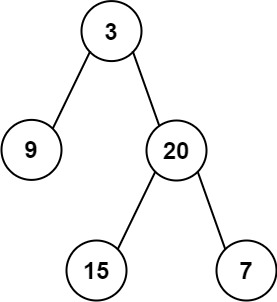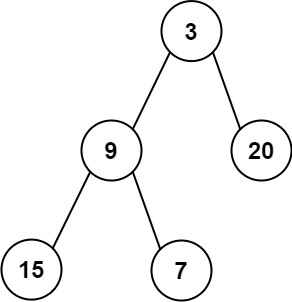Average of Levels in Binary Tree
EasyUpdated: Aug 2, 2025
Practice on:
Problem
Given the root of a binary tree, return the average value of the nodes on each level in the form of an array. Answers within 10-5 of the actual answer will be accepted.
Examples
Example 1

Input: root = [3,9,20,null,null,15,7]
Output: [3.00000,14.50000,11.00000]
Explanation: The average value of nodes on level 0 is 3, on level 1 is 14.5, and on level 2 is 11.
Hence return [3, 14.5, 11].
Example 2

Input: root = [3,9,20,15,7]
Output: [3.00000,14.50000,11.00000]
Constraints
- The number of nodes in the tree is in the range
[1, 10^4]. -2^31 <= Node.val <= 2^31 - 1
Solution
Method 1 – Level Order Traversal (BFS)
Intuition
The key idea is to process the tree level by level using a queue (Breadth-First Search). For each level, sum the node values and divide by the number of nodes at that level to get the average.
Approach
- Initialize an empty list
ansto store averages. - Use a queue to perform BFS, starting with the root node.
- While the queue is not empty:
- Record the number of nodes at the current level.
- For each node at this level:
- Pop it from the queue.
- Add its value to a running sum.
- Add its children to the queue if they exist.
- Compute the average for this level and append to
ans.
- Return
ans.
Code
C++
class Solution {
public:
vector<double> averageOfLevels(TreeNode* root) {
vector<double> ans;
queue<TreeNode*> q;
q.push(root);
while (!q.empty()) {
int n = q.size();
double sum = 0;
for (int i = 0; i < n; ++i) {
TreeNode* node = q.front(); q.pop();
sum += node->val;
if (node->left) q.push(node->left);
if (node->right) q.push(node->right);
}
ans.push_back(sum / n);
}
return ans;
}
};
Go
func averageOfLevels(root *TreeNode) []float64 {
var ans []float64
q := []*TreeNode{root}
for len(q) > 0 {
n := len(q)
sum := 0
for i := 0; i < n; i++ {
node := q[0]
q = q[1:]
sum += node.Val
if node.Left != nil {
q = append(q, node.Left)
}
if node.Right != nil {
q = append(q, node.Right)
}
}
ans = append(ans, float64(sum)/float64(n))
}
return ans
}
Java
class Solution {
public List<Double> averageOfLevels(TreeNode root) {
List<Double> ans = new ArrayList<>();
Queue<TreeNode> q = new LinkedList<>();
q.offer(root);
while (!q.isEmpty()) {
int n = q.size();
double sum = 0;
for (int i = 0; i < n; i++) {
TreeNode node = q.poll();
sum += node.val;
if (node.left != null) q.offer(node.left);
if (node.right != null) q.offer(node.right);
}
ans.add(sum / n);
}
return ans;
}
}
Kotlin
class Solution {
fun averageOfLevels(root: TreeNode?): List<Double> {
val ans = mutableListOf<Double>()
val q = ArrayDeque<TreeNode>()
if (root != null) q.add(root)
while (q.isNotEmpty()) {
val n = q.size
var sum = 0.0
repeat(n) {
val node = q.removeFirst()
sum += node.`val`
node.left?.let { q.add(it) }
node.right?.let { q.add(it) }
}
ans.add(sum / n)
}
return ans
}
}
Python
class Solution:
def averageOfLevels(self, root: Optional[TreeNode]) -> list[float]:
ans: list[float] = []
q: list[TreeNode] = [root]
while q:
n = len(q)
s = 0
for _ in range(n):
node = q.pop(0)
s += node.val
if node.left:
q.append(node.left)
if node.right:
q.append(node.right)
ans.append(s / n)
return ans
Rust
impl Solution {
pub fn average_of_levels(root: Option<Rc<RefCell<TreeNode>>>) -> Vec<f64> {
let mut ans = vec![];
let mut q = vec![];
if let Some(node) = root {
q.push(node);
}
while !q.is_empty() {
let n = q.len();
let mut sum = 0f64;
let mut next = vec![];
for node in q {
let node = node.borrow();
sum += node.val as f64;
if let Some(ref l) = node.left {
next.push(Rc::clone(l));
}
if let Some(ref r) = node.right {
next.push(Rc::clone(r));
}
}
ans.push(sum / n as f64);
q = next;
}
ans
}
}
Complexity
- ⏰ Time complexity:
O(N)whereNis the number of nodes (each node is visited once). - 🧺 Space complexity:
O(W)whereWis the maximum width of the tree (max number of nodes at any level).